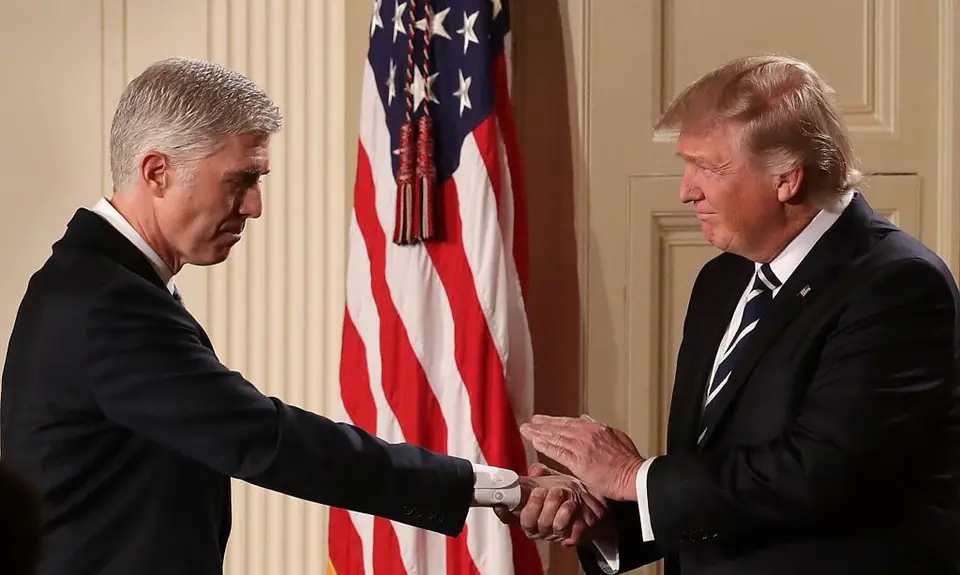“Confirmed Judges, Confirmed Fears” is a blog series documenting the harmful impact of President Trump’s judges on Americans’ rights and liberties.
The two Supreme Court justices selected by President Trump made the difference in a 5-4 case decided on April 24 called Lamps Plus v. Varela. Neil Gorsuch and Brett Kavanaugh made it possible for the Court to take yet another step to reshape the law to strip working people of their rights against powerful corporations.
More specifically, Lamps Plus is the latest 5-4 ruling by the elitist ultra-conservatives that strengthen large businesses’ ability to force one-on-one arbitration on employees, customers, and smaller businesses. As Justice Ginsburg explained in her dissent, “employees and consumers forced to arbitrate solo face severe impediments to the vindication of their rights.” Nevertheless, the far-right majority has upheld arbitration requirements in contracts that were invalid under state law, in contracts imposed through the unlawful use of monopoly power, and in contracts forcing employees to waive rights that federal labor law says cannot be waived.
In this case, Lamps Plus revealed confidential tax information for 1,300 of its employees. This led to someone filing a fraudulent tax return for employee Frank Varela. Varela wanted to hold the company accountable for the harm done to him and his coworkers. His employment contract called for all disputes to be resolved through arbitration. It did not limit Varela to “one-on-one” arbitration, just to “arbitration” in general, a term that includes both solo and class arbitration—that is, arbitration on behalf of a class or group of individuals. Even if it were ambiguous whether Varela had intended to eliminate his ability to use the group form of arbitration, state law mandates that any ambiguity in any “take it or leave it” contract be interpreted in favor of the party that had no voice in its drafting (regardless of whether it involves arbitration).
Nevertheless, in an opinion authored by the Chief Justice, the far-right majority—bending logic and the law—managed to conclude that (1) the contract was ambiguous on whether the parties intended the term “arbitration” to be limited only to “one-on-one arbitration;” (2) class arbitration is annoyingly time-consuming, so courts should assume that parties don’t intend for it to be an option unless they specifically say so; and (3) the state law on interpreting a “take-it-or-leave-it” contract against the drafter is “flatly inconsistent with the foundational FAA [Federal Arbitration Act] principle that arbitration is a matter of consent.” So voila, Lamps Plus gets to unilaterally eliminate class-arbitration redress. The big company wins again.
Justice Ginsburg’s dissent accurately frames the big picture:
[I] emphasize once again how treacherously the Court has strayed from the principle that arbitration is a matter of consent, not coercion.
Congress enacted the Federal Arbitration Act (FAA) in1925 to enable merchants of roughly equal bargaining power to enter into binding agreements to arbitrate commercial disputes. The Act was not designed to govern contracts in which one of the parties characteristically has little bargaining power. [internal quotations and citations removed]
Ginsburg pointed out the irony of the majority’s claim that because “arbitration is strictly a matter of consent,” the Court imposed individual arbitration on employees who surely would not choose to proceed solo:
Shut from the Court’s sight is the Hobson’s choice employees face: accept arbitration on their employer’s terms or give up their jobs.
The addition of Gorsuch and Kavanaugh to the Court is what has made it possible for the Court to ignore the real world and create a fiction that serves the interests of the business elite. Had a fair-minded constitutionalist filled either of the vacancies left by Justices Scalia and Kennedy, today’s ruling would likely have come out very differently.
